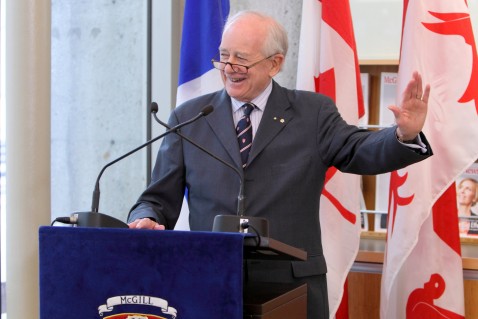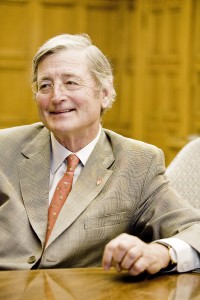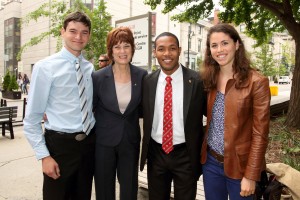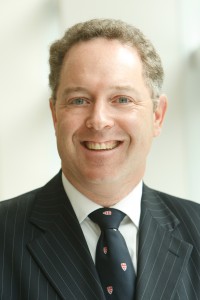Re Ian Bremmer 'Could third-party candidates upend the 2024 US election?' 3 April The current political movement in the USA…
Campaign McGill raises $1 billion+
Written by Diana Thebaud Nicholson // July 23, 2013 // Education, Montreal // Comments Off on Campaign McGill raises $1 billion+
Cause for celebration
Campaign McGill raised more than a billion dollars for the University. The benefits will be spread far and wide, but McGill’s students are the biggest winners.
by Daniel McCabe, BA’89
Campaign McGill co-chair Yves Fortier announced the campaign’s final results at a press conference in June. (Photo: Owen Egan)
What can you buy for a billion dollars these days?
Facebook spent that much on Instagram. Twenty-five private jets would set you back roughly $1 billion. According to Forbes, you could buy the Chicago Cubs, a baseball team with a long history of losing more games than it wins.
Or, you could invest that money in a university, one with a proven track record and no shortage of ambitions for the 21st century, and watch what happens.
More than 95,600 donors pooled their resources in recent years and decided to skimp on the jets. They’d rather see what McGill can do with a billion dollars—$1,026,072,593, to be precise.
Campaign McGill co-chair Yves Fortier, BCL’58, LLD’05, announced the campaign’s final fundraising totals at a press conference in June. “Donors from all walks of life and from over 100 countries around the globe, they all share a common belief,” said Fortier. “They believe in the incredible things that can happen when a world-class university is fuelled by the vision and generosity of its donors.”
Campaign McGill co-chair Michael Meighen (Photo: Claudio Calligaris)
Fortier, a Montreal lawyer and a former president of the UN Security Council, was one of three McGill graduates to serve as co-chairs for the campaign, which was publically launched in 2007 with a goal of $750 million. The other co-chairs were Eugene McBurney, LLB’77, the chairman of GMP Securities Europe, and Senator Michael Meighen, BA’60.
The campaign, said Fortier, “has exceeded all our expectations in a most extraordinary way.”
About 48 percent of the money that Campaign McGill received from individual donors came from inside Quebec. Roughly 36 percent of the gifts were made by donors from the rest of Canada and about 16 percent of the donations were received from outside the country.
“I find that [mix] very gratifying,” says Meighen. “McGill is Quebec’s university as well as Canada’s university. We were able to get to that deep vein of loyalty that McGill alumni, wherever they live, feel towards the institution. It’s a little like being associated with the Montreal Canadiens. You’re always proud to have that connection.”
“What’s even more important than the amount of money we’ve raised,” says Vice-Principal (Development and Alumni Relations) Marc Weinstein, BA’85, BCL’91, LLB’91, “is what that money will enable us to do.”
Changing students’ lives
Former principal Heather Munroe-Blum with students and recent graduates who benefitted from awards and scholarships, (l to r) Martin Legault, David D’Oyen and Sarah McCuaig.
Most of the money raised—more than 60 percent—will be used for supporting students and student-related programs at McGill. More than 600 new scholarships, graduate fellowships, bursaries and awards have been created as a result of the campaign and more than 3,700 McGill students are already directly benefitting from that support.
McGill’s most recent Rhodes Scholar, Sarah McCuaig, BSc’13, took part in the Campaign McGill press conference to underline the life-changing impact that this sort of support can have on a student.
“One of my apprehensions about coming to university was how was I going to be able to balance my finances and the expense of coming to university with everything else I wanted to do,” she explained.
After receiving a Greville Smith entrance scholarship, McCuaig felt free to take on some interesting part-time jobs in the Department of Microbiology and Immunology, even if they didn’t pay well enough to cover her bills. “Being able to take these research jobs knowing I didn’t have to worry about my finances meant that I could do what I loved.”
The scholarship support also allowed McCuaig the freedom to pursue athletics at McGill. She became a star performer on the University’s track and field squad. “I am a direct product of philanthropy,” she said. “I hope to have the opportunity to pay it forward in the future and give back to students here.”
McCuaig hails from Waterloo, Ontario. Some of the students who will be benefitting from Campaign McGill’s success will be coming to the University from considerably further afield.
McGill will be receiving $27 million from the MasterCard Foundation over the next 10 years to support 91 students from Africa—67 undergraduates (roughly half of whom will be arriving from French-speaking countries) and 24 students pursuing master’s degrees.
The University was selected to be one of 15 universities from around the world taking part in the MasterCard Foundation Scholars Program, a $500 million effort aimed at nurturing a generation of potential African leaders.
“We asked ourselves, ‘What would be a game changer for Africa?’” says the foundation’s director of youth learning, Deepali Khanna. The foundation is reaching out to academically gifted students in disadvantaged communities and offering them the chance to pursue their studies at world-class universities. The students chosen to be MasterCard scholars have demonstrated leadership potential as well as a commitment to improving the lives of others in their respective countries.
The support offered by the foundation goes beyond picking up the tab for tuition. The foundation helps arrange mentoring and internship opportunities for the students in their home countries. And, says Khanna, it expects its university partners to play a similarly supportive role. McGill wasn’t chosen just for its academic quality, but also for its willingness to help the students adjust to their new surroundings. “This is a huge adjustment for these students,” Khanna says. “Most of them have never even been on an airplane before.”
Students aren’t the only ones to profit from Campaign McGill’s success. About 17 percent of the money raised is being used to support McGill’s research programs. That support is being felt in a variety of ways.
A boost for researchers
Vice-Principal (Development and Alumni Relations) Marc Weinstein (Photo: Owen Egan)
Andrew Hendry is an associate professor of biology and an expert on the interrelationship between evolution and ecology. He is also one of the McGill faculty members who have benefitted from the Tomlinson Scientist Awards established in 2009. The awards provide seed money to exceptional researchers working on promising projects. Even for scientists with an established track record, such support can be crucial, says Hendry.
“It allowed me to fund my graduate students and to keep my research program going,” says Hendry, who is involved in projects in the Galapagos Islands, Trinidad and British Columbia.
“There are very few strings attached” to the Tomlinson funding, Hendry adds. “So much research funding is targeted now. You need to be able to partner with industry, or you need to be able to demonstrate the benefits of your research within a certain time frame. With certain types of research, you only see the benefits years down the road.”
Even research that promises a relatively quick payoff requires a boost now and then.
Paul Wiseman, a professor of chemistry and physics, has been working on a promising new method for detecting the presence of malaria in blood cells. Malaria causes hundreds of thousands of deaths each year and treatment for the infection is most effective when it is detected early on.
While Wiseman had initial funding to pursue the project, “we ran into a major wall.” A company which promised to provide a key component for the device Wiseman was working on failed to deliver. Thanks to a Fessenden Professorship, which provides funding to encourage the commercialization of innovative technologies developed by researchers in the Faculty of Science, Wiseman was able to keep the project on track. He found a different supplier, fine-tuned the technology, created a test device and was awarded a patent.
“That really bought us some breathing room,” Wiseman says of the Fessenden funding. “I don’t know what we would have done if it wasn’t available.”
Both the Tomlinson and Fessenden programs were the results of gifts made to the Faculty of Science during Campaign McGill. Every faculty at the University has prospered from the campaign’s success.
The Faculty of Engineering, for instance, has quadrupled the number of graduate fellowships it’s able to offer to top doctoral and master’s students. Gifts to the Faculty of Agricultural and Environmental Sciences have helped cement its reputation as an academic leader in food security and food safety. The Faculty of Law established several new research chairs in areas ranging from tax law to international arbitration to civil society and public policy. In total, Campaign McGill sparked the creation of 46 new endowed chairs for leading scholars across the University.
The Faculty of Religious Studies has also flourished. A $5 million gift from Barbara Keenan, BA’54, and Patrick Keenan, BCom’54, CA’57—the largest donation made to the faculty since its founding—will, among other things, result in the creation of the Barbara and Patrick Keenan Chair in Interfaith Studies. The faculty also recently hosted the inaugural Birks Forum on the World’s Religions and Public Policy, an initiative made possible by a gift from the Birks Family Foundation.
“We’ve been able to take our ideas and make them real,” says Dean of Religious Studies Ellen Aitken. “We’ve launched major new initiatives examining the role that religion plays in public life around the globe.”
A crisis enters the picture
While the final results for Campaign McGill are undeniably impressive, Michael Meighen acknowledges that there were a few bumpy moments along the way. No one could have predicted that shortly after the campaign was publicly launched, a global economic crisis would wreak widespread havoc. “It was a little nerve-wracking at times,” says Meighen.
“There was tremendous nervousness in the air and we were sensitive to that,” says Weinstein of McGill’s response to the financial upheaval. “There was no hard sell, but we didn’t stay away either. We always saw the campaign as an opportunity to reconnect with our alumni and our donors. We didn’t always do a very good job of maintaining the connections that we had built up in previous campaigns, and we wanted to work on that.”
Principal Heather Munroe-Blum travelled widely, meeting graduates around the world. Speaking events featuring top professors from the University were organized in cities with large McGill alumni communities. Career networking events were also put together for alumni.
“We demonstrated our commitment to reestablishing those relationships and I think it paid off for us,” says Weinstein.
He adds that the campaign wouldn’t have fared nearly as well without the principal’s enthusiastic support.
“Her energy and drive were absolutely crucial. Wherever we went [on campaign-related trips], she was always the main attraction. People wanted to know who she was and what she represented. People wanted to know what the vision was for McGill’s future and she was the person who could deliver that.”
“Marc and his team did a tremendous job,” says Meighen, “but Heather was our best fundraiser.”
At the official closing press conference for Campaign McGill, Munroe-Blum said there was no shortage of candidates who can share the credit for the campaign’s remarkable totals.
“No great achievement happens—and certainly not one of this magnitude —without thousands of people being committed to having a strong University that serves at the highest level.”
“I think, with this campaign, we really developed a deep-rooted culture of philanthropy across the University,” says Weinstein. It isn’t enough for professional fundraisers to pound the pavement in search of philanthropic dollars, he says. It has to be a community effort, with senior administrators, faculty members, students and dedicated volunteers all playing key roles. “When donors see that level of engagement, it really does have an impact on the decisions that they make.”
At the press conference, Munroe-Blum warned that even a fundraising initiative this successful is no cure-all. Building a stable and healthy university system requires more than one source of funding. “You can’t do that on philanthropy alone. You can’t do that on government support alone. And you can’t do that on tuition alone. You need all three to come together and each to stay the course to the best of their ability.”
From Meighen’s perspective, McGill couldn’t be the adventurous world-class university it is without the generosity of its donors. “That’s as plain to me as the nose on my face.”
He believes the 95,619 donors who contributed to Campaign McGill made the right call.
“What better investment can you make in the future of the country than investing in its young people? What other investment keeps on giving and giving and giving in the same way?”
Private jets, however flashy, eventually break down. The Cubs are struggling through another tough season. McGill is closing in on its 200th anniversary and it’s looking stronger than ever.
For more information about Campaign McGill and the impact it’s having on the University, visit www.mcgill.ca/campaign.







